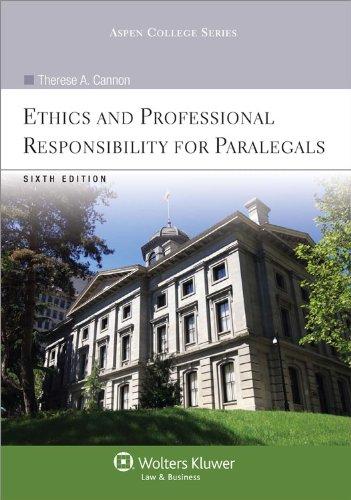In 1982 the Orange County Apartment News carried an advertisement for the eviction services provided by LPS.
Question:
In 1982 the Orange County Apartment News carried an advertisement for the eviction services provided by LPS. The ad stated ‘‘Evictions as low as $65’’ and showed the picture of a purposeful and authoritative looking man, arms folded across his chest, stating: ‘‘One low price $65 plus costs uncontested or contested in pro per. Attorney for trial extra if needed.’’ Below the picture were the words ‘‘Time to Act!’’ and ‘‘Call &
talk to us.’’ The advertisement ended with an address and telephone number.
In 1982 Roberta Spiegel decided to evict the tenants of an apartment she owned. A friend recommended LPS. Roberta spoke to Bill Watts, an employee of LPS, who told her to come to the LPS office and bring all documentation related to the rental. On arrival Roberta was given a booklet with Mr. Watts’s business card attached. The card was imprinted with the words ‘‘Landlord’s Professional Services’’ and the name Bill Watts. Beneath Mr. Watts’s name was the word ‘‘Counselor.’’
The booklet begins with a chronology of an unlawful detainer action as carried out by the eviction service. The chronology was generally factual. However, at the end of the chronology, this bit of advice is imparted concerning what to do after the tenants have been evicted: ‘‘You must change the locks at that time. If you do not change the locks you may have a problem. The defendant may re-enter and take possession, and the ball game starts from the beginning.’’
The following pages of the booklet contain examples of the types of forms used in an unlawful detainer action and provide a guide for how those forms should be completed. Often the guidance is purely factual, i.e., where a form requires the name of the city in which the subject property is located the guide states ‘‘enter city.’’ The advice given, however, can be more useful. In discussing the ‘‘Notice to Pay Rent or Quit,’’ for example, the guide states: ‘‘Acceptance of any money after service may void notice. You don’t have to accept money after notice expires.’’
Bill Watts reviewed the normal routine in an unlawful detainer action with Roberta, who was unfamiliar with eviction procedures.
Roberta asked questions about the procedure and Bill answered them.
Roberta told Bill she had already mailed the tenants a three-day notice.
Bill told her this was insufficient and she would have to take another notice to the apartment. Bill asked Roberta questions and completed the documents and forms necessary for the unlawful detainer action and eventually filed them.
On December 7, 1982, Ralph Lopes, an investigator with the Orange County District Attorney’s Office, called LPS and stated he was a property owner who was interested in eviction services. . . . The procedure for commencing and carrying through an unlawful detainer action was explained by Jacqueline Sutake, an LPS employee. . . . Lopes asked what it meant in the LPS ad when it stated ‘‘pro per.’’ Sutake explained LPS was not an attorney and Lopes would be representing himself. Sutake stated LPS could.....
Questions about the Case 1 What specific conduct by LPS constituted unauthorized practice of law? What conduct constituted false or misleading advertising?
2 What definition of the practice of law does this court use? How does it compare to other definitions cited in this chapter?
3 How did the prosecutor’s office investigate LPS?
4 Does it make any difference that an eviction is simple and many nonlawyers could file the appropriate papers without any help?
5 Did the court cite any instances where LPS customers were given bad advice or were harmed?
Step by Step Answer:

Ethics And Professional Responsibility For Paralegals
ISBN: 272860
6th Edition
Authors: Therese A. Cannon





